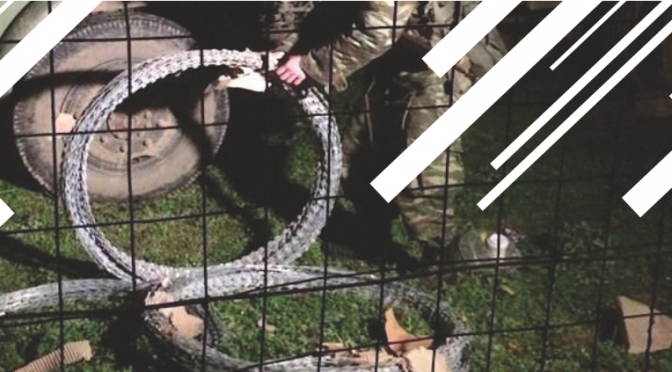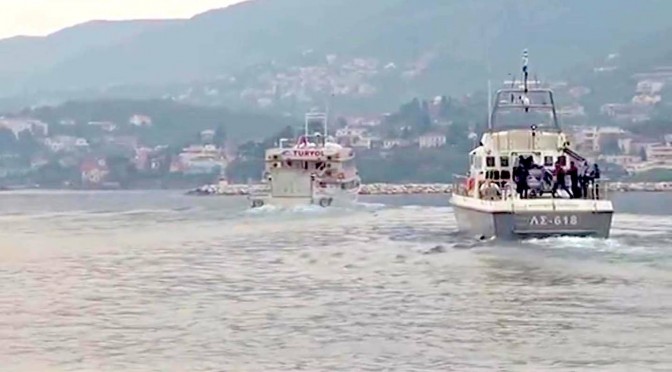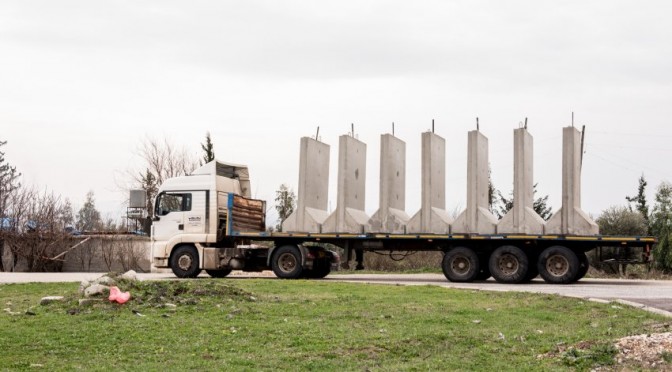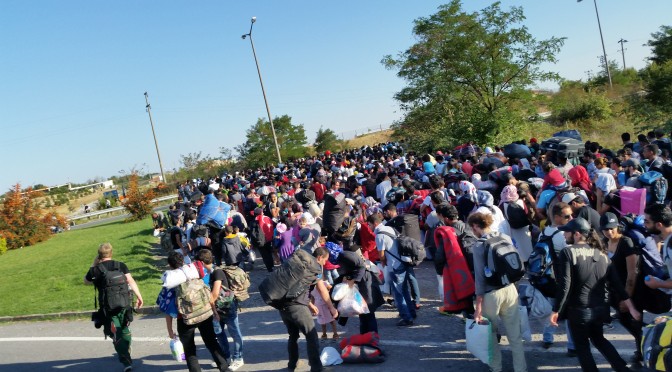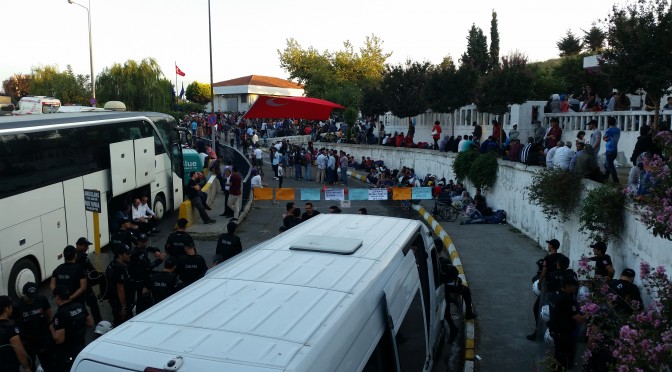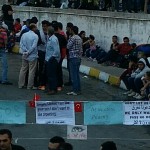Es war zu erwarten: 4 Jahre Zuschauen zeigen jetzt ihre katastrophale Wirkung. Der Corona-Virus hat auch die griechischen Inseln erreicht. 40.000 Menschen, zusammengepfercht in völlig überfüllten EU-Hotspot Lagern wie Moria, unter desaströsen Hygiene-Bedingungen und fast ohne medizinische Versorgung, könnten schon bald der tödlichen Krankheit ausgeliefert sein. Während europäische Staaten zum Schutz vor der Pandemie ihre Grenzen schließen und selbst soziale Begegnungen von Kleingruppen unterbinden, ist das von der Austeritätspolitik und Wirtschaftskrise schwer angeschlagene griechische Krankensystem in keiner Weise in der Lage, bei einem großflächigen Krankheitsausbruch die notwendige medizinische Versorgung der Geflüchteten sicherzustellen. Und die EU versperrt sich weiterhin allen Appellen, die Lager zu räumen und die Menschen sicher zu evakuieren. Vielmehr wird verstärkt abgeriegelt.
Aufnehmen statt Sterben Lassen! weiterlesenArchiv der Kategorie: Türkei
REFUGEES WELCOME! DON’T SHOOT! STOP EUROPES’S TREND TOWARDS FASCISM!
It happened as it was to be expected: Four years of standing on the sidelines have resulted in a catastrophe. 40,000 human beings, penned up in hopelessly overcrowded EU-hotspot centres like Moria on Lesvos Island, living under squalid living and hygienic conditions, will soon face the deadly disease. European countries close their borders and enforce social distancing in order to curb the spread of the pandemic. But the Greek health system, already severely weakened by austerity policies and the economic crisis, is in no condition to guarantee the medical care for refugees once the pandemic starts spreading widely. Yet still, the EU does not answer the numerous appeals to evacuate the centres and to bring those affected to safety. Internment is the EU’s answer.
REFUGEES WELCOME! DON’T SHOOT! STOP EUROPES’S TREND TOWARDS FASCISM! weiterlesenZwischen Abschiebung, Protest und rassistischer Gewalt
Am vergangenen Freitag, den 8. April 2016 wurde die zweite Abschiebung im Rahmen des EU-Türkei Abkommens durchgeführt. 45 Personen von Lesbos und 95 weitere von den Inseln Samos und Kos wurden mit gecharterten Fähren in die türkische Hafenstadt Dikili gebracht. Erneut wurde ein enormes Polizeiaufgebot aufgefahren, um die Abschiebungen durchzusetzen. Am Hafen von Lesbos sprangen drei Aktivist_innen ins Wasser, um symbolisch ihren Protest zu äußern. Zwischen Abschiebung, Protest und rassistischer Gewalt weiterlesen
Panik vor dem Frühling: EU bei „managing the refugee crisis“ unter Zeitdruck
Beim EU-Gipfel am 18./19. Februar wird die “Bewältigung der Flüchtlingskrise” weiter im Mittelpunkt stehen. Der Joint Action Plan mit der Türkei und der Druck auf Griechenland zur besseren Zusammenarbeit hat noch nicht die erwünschte Wirkung gezeigt. Zwar spricht die Kommission in ihrer am 10.2. veröffentlichten Bestandsaufnahme über die Implementierung der im Dezember beschlossenen Maßnahmen von “großen Erfolgen”. Außer der Steigerung der Registrierungszahlen und abgenommenen Fingerabdrücke in Italien und Griechenland, bestätigt der Bericht jedoch eher eine stockende Umsetzung und wenig politischen Willen der Mitgliedsstaaten.
Panik vor dem Frühling: EU bei „managing the refugee crisis“ unter Zeitdruck weiterlesen
Turkey: Negotiating the “Harmonization”
Article by Mathias Fiedler, Photos by Charlotte Schmitz
One can recognize the negotiation process between the EU and Turkey in the so called “harmonization packages“ which were aimed to harmonize Turkish law with the European Union legislation[1]. The EU is more than ever before eager to collaborate with Turkey and both “partners“ agreed on a “joint action plan” concerning migration [2]. Turkey, being the most important transit country to Europe, is one of the “focal points of the EU’s externalization strategy” and the EU promised three Billion EUR for the reception of refugees. But while the EU-countries still are in disagreement on how to raise that sum, Erdoğan already stated that this amount of money won’t be enough anyway. However, the closer EU-Turkey collaboration has already had negative effects for refugees in Turkey: Refugee rights organizations stated that “more detention“ and “less reception” was one of the first consequences of the agreement [3].
Edirne: refugees demand safe passage to Greece
#CrossingNoMore Solidarity Group, Edirne/Istanbul
We don’t want food, we don’t want water, we don’t want humanitarian help, we want to cross the border by the land. We will cross or die here.
For 5 days in Edirne, Turkey, around 3000 thousands migrants (mostly syrians but also Aghanis, Iraqis and others) gathered, following a call started on a Facebook page („Crossing no more“), to ask for the Turkish-Greek border to be opened for them. They refuse to risk their lives in the Aegean sea anymore to reach a European country where they’ll finally be safe, get basic human rights and have a chance to make a life for themselves.
#crossingnomore: “We don’t want to drown no more!”
Mathias Fiedler, Istanbul
It has been in planning for some time. While many people are trying to escape at Izmir and Bodrum via boat for quite a long time now. Especially in the warlike areas at the borders with Syria and Iraq, the pogroms against Kurdish civilians and hundreds of HDP offices and Kurdish shops destroyed the hope for many migrants to find a peaceful life in Turkey. Yet, after hearing the good news of thousands welcomed to Europe, people have found new hope. The group called out for a protest via Social Networks and informed Media and humanitarian organizations about it. The first sentence reads as follows:
Because of the death of too many of our brothers and the fatal risks they have to take to cross the border from Turkey to Greece in order to make a better life for themselves, we are planning to gather at the border around Edirne on 15th of September 2015 and claim for our right to cross it safely.
#crossingnomore: “We don’t want to drown no more!” weiterlesen
